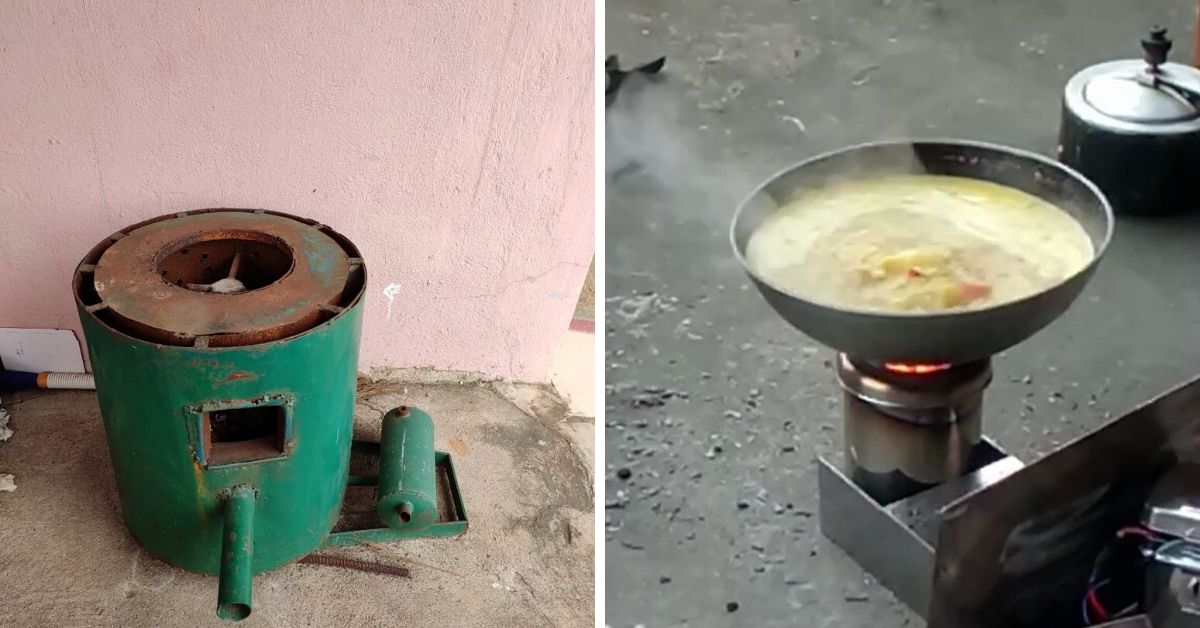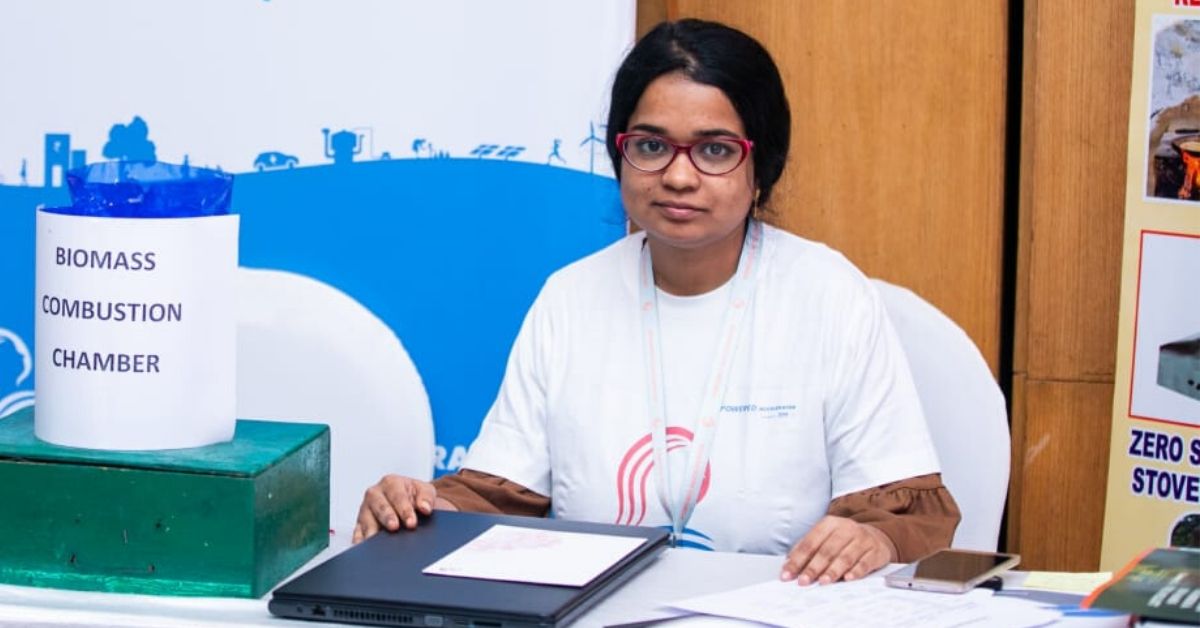Reports state that the second leading environmental cause of death in the world is pollution from indoor fires. Each year, around 3.8 million people die prematurely from diseases caused due to indoor air pollution, like stroke, pneumonia, respiratory diseases, and cancer. Unfortunately, the same report estimates that more than three billion people globally use either biomass, kerosene, or coal as cooking fuel.
Having grown up seeing the ill-effects of indoor pollution in her home, Bhubaneshwar-based Debashree Padhi, an engineer, developed a solution that addresses two of India’s biggest air pollution causes—biomass fuels and stubble burning.
“As a child, I would often be refrained from entering the kitchen, thanks to all the smoke. This was the case in households that did not have an LPG connection. Smoke emitted from traditional chulhas affected my relative’s lungs and even caused other health issues like eye irritation,” Debashree tells The Better India.
The 23-year-old has designed ‘Agnis’ cooking stoves that produce no particulate matter and emits less than 0.15 ppm carbon monoxide. Another advantage of Agnis is that the users do not have forage in the forests for firewood.

The best part?
The end-to-end clean cooking technology reduces the cooking time by half compared to regular stoves.
Summer Vacations Inspiration
Growing up, Debashree spent her summer vacations in her native place Naami in Odisha’s Bhadrak district and saw how the cooking process was always a struggle.
Debashree disliked such traditional stoves that both caused misery to the people in the house and daily exploited forest resources for fuel.
The opportunity to solve this persistent problem came in the form of a project.
“In our third year at college, our faculty asked us to find a solution to a problem that affected the population at large. Indoor air pollution was something that I was aware of and had seen it in close proximity. I was excited to make a smokeless chulha,” shares Debashree who completed her engineering at the Central Institute of Plastics Engineering & Technology, Mysuru, Karnataka.
Research, development and many trials led to a smokeless stove prototype. Impressed by her efforts, her college professors encouraged her to participate in the central government’s Micro, Small & Medium Enterprises incubation programme in Bhubaneshwar.
Not only the organisers accepted her prototype, they also trained her to modify the product in 2015. At the end of the programme, she received funding of Rs 6.25 lakhs to commercialise her product.
With the incubation money and some help from her family, Debashree registered her own company DD Biosolution Technology and further developed the agro-waste clean cooking fuel technology.
Two Problems, One Solution
A United Nations Environmental Programme study estimates that indoor pollution contributes anything between 22 to 52 per cent to the overall pollution levels. The research suggests the use of clean cooking fuels to improve the situation.
Meanwhile, stubble burning in northern states spike up air pollution every winter, often pushing the national capital to declare a public health emergency. Recently, Safar, an air quality monitoring authority reported that illegal crop burning caused 46 per cent of Delhi’s pollution.
Keeping in mind the household needs and the problem of stubble waste disposal, Debashree built three types of burners shaped like regular cooking stoves.
Made of stainless steel, the three stoves – Nano, single burner and double burner are available in the price range of Rs. 2,800 to 4,500. While the single and double burners are designed for household usage, the nano gas is portable and can even be carried in a bag.
All three stoves run on agro-mass pellets shaped like bullets. A mixture of agriculture residue, jaggery, limestone and clay is added in a pellet-making machine (patent of DD Bio solution Technology). The machine takes one hour to prepare 300 kilos of pellets.
Debashree acquired certification for the technology from CSIR – Institute of Minerals & Materials Technology, Bhubaneshwar, and the stoves went on sale in March this year.
She sold 25 stoves in Naami village and also rented the pellet-making machine to two local farmers, who collect the agro-waste from their fellow farmers to prepare the mix and sell them.
One kilo of pellets, which can fuel 50 minutes of cooking, is sold at Rs 6. The profits earned are shared among Debashree and the farmers. Since the cooking process is two times faster of Agnis, villagers spend Rs 120-150 per month on pellets on an average.
Impact and the Way Forward
Prerna, a resident of Naami village, was amazed at how much the alternative stove has affected her health positively. “My coughing has reduced and my eyes do not water anymore while cooking,” she tells The Better India.
Prerna is one of the 25 rural women who have discontinued using pollution-causing biomass fuels like cow dung, lignite, coal, kerosene and firewood for cooking purposes. All the households have shifted to zero smoke cooking stove—Agnis.
“It takes only 5 minutes to prepare rice and 10 minutes for daal on Agnis stove. We don’t mind spending on the clean fuel as it is safe and pollution-free. My mom’s eye allergy has ended, and the walls in our kitchen are no more black from the smoke,” says Sarthak Ravatray, another beneficiary.
From the positive feedback she has received so far, Debashree aims to take her technology to urban areas as well.
“The stoves are ideal for community kitchens, street vendors, schools and small-scale restaurants. We have already sold stoves to two dhabas in Bhubaneshwar. There is a demand for the portable stoves as well, and for the same, we are working on developing versions that will suit the urban needs,” she says.
Such inventions are the need of the hour, especially across the South Asian countries where biomass fuel and coal are heavily used for cooking. Not only it would show improved health among the populace, reduce their expenditure on treatments, cut down the cooking time, but also make the air less poisonous.
You can contact the young innovator at: http://www.ddbiosolutiontechnology.com/
Know more about the ATL Tinkering Innovation Marathon here.
(Edited by Saiqua Sultan)
Like this story? Or have something to share?
Write to us: contact@thebetterindia.com
Connect with us on Facebook and Twitter.
We bring stories straight from the heart of India, to inspire millions and create a wave of impact. Our positive movement is growing bigger everyday, and we would love for you to join it.
Please contribute whatever you can, every little penny helps our team in bringing you more stories that support dreams and spread hope.

